Evaluating Dr. Norman Geisler's Lecture on Biblical Introduction
VerifiedAdded on 2023/05/31
|5
|1016
|180
Essay
AI Summary
This essay provides an analysis of Dr. Norman Geisler's lecture at the Veritas Evangelical Seminary, focusing on his defense of Biblical inerrancy. It examines the strengths of his arguments, such as his emphasis on the Holy Trinity and Jesus' affirmation of the Bible's accuracy, while also addressing weaknesses, including repetitive phrasing and a limited scope of counter-arguments from other authors critiquing the Bible. The essay concludes that while Dr. Geisler presents a detailed case, the landscape of Biblical criticism contains numerous opposing viewpoints that warrant consideration. Desklib provides a platform to explore more such documents and study resources.
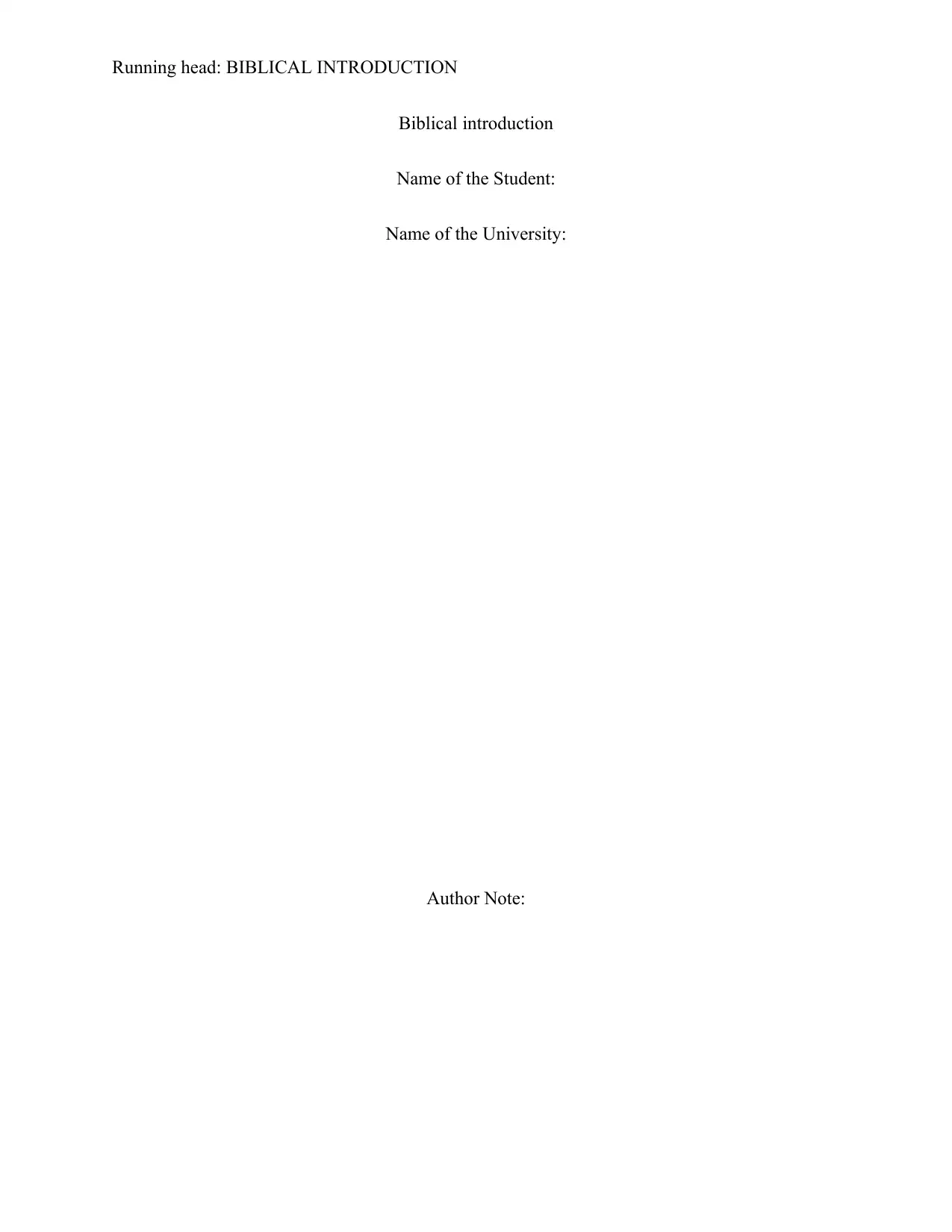
Running head: BIBLICAL INTRODUCTION
Biblical introduction
Name of the Student:
Name of the University:
Author Note:
Biblical introduction
Name of the Student:
Name of the University:
Author Note:
Paraphrase This Document
Need a fresh take? Get an instant paraphrase of this document with our AI Paraphraser
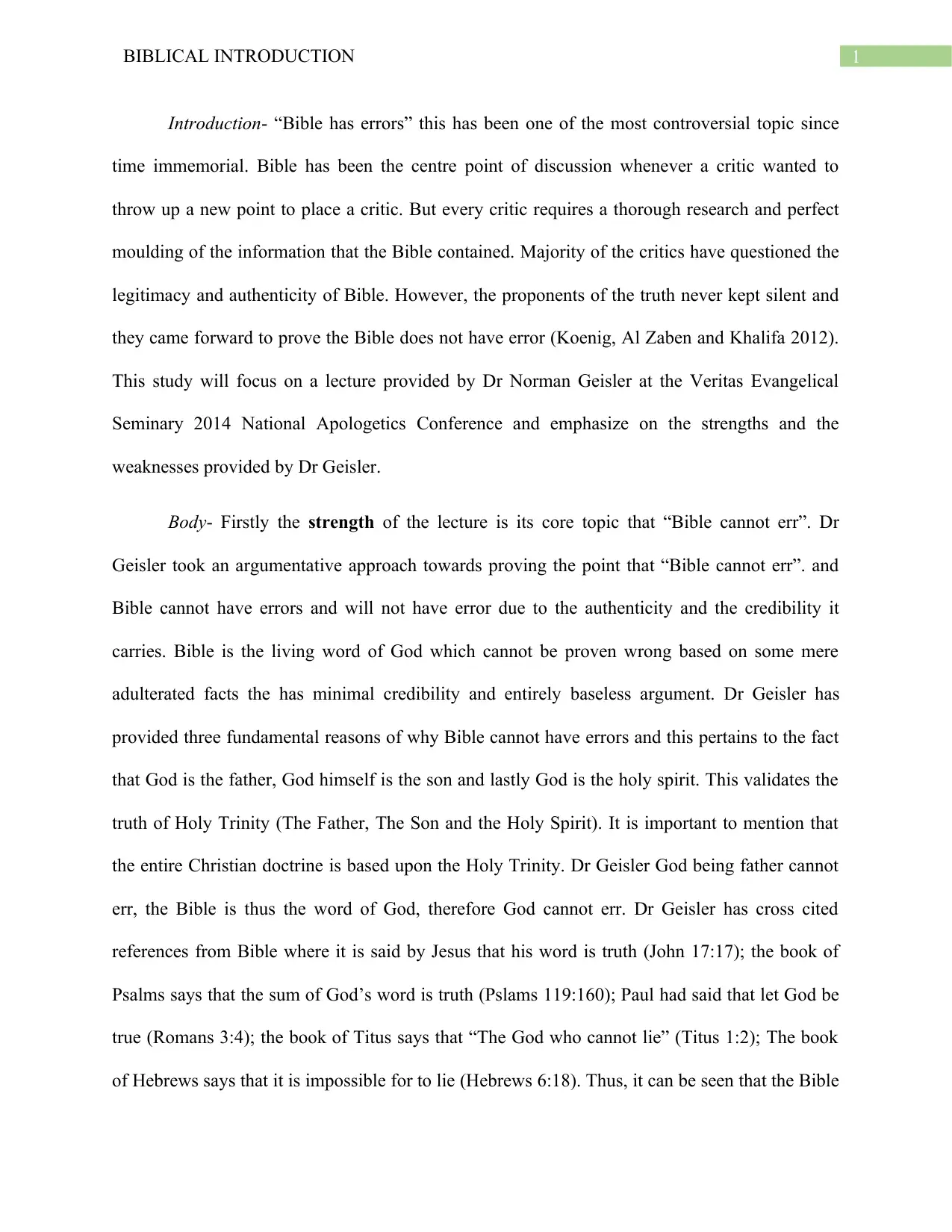
1BIBLICAL INTRODUCTION
Introduction- “Bible has errors” this has been one of the most controversial topic since
time immemorial. Bible has been the centre point of discussion whenever a critic wanted to
throw up a new point to place a critic. But every critic requires a thorough research and perfect
moulding of the information that the Bible contained. Majority of the critics have questioned the
legitimacy and authenticity of Bible. However, the proponents of the truth never kept silent and
they came forward to prove the Bible does not have error (Koenig, Al Zaben and Khalifa 2012).
This study will focus on a lecture provided by Dr Norman Geisler at the Veritas Evangelical
Seminary 2014 National Apologetics Conference and emphasize on the strengths and the
weaknesses provided by Dr Geisler.
Body- Firstly the strength of the lecture is its core topic that “Bible cannot err”. Dr
Geisler took an argumentative approach towards proving the point that “Bible cannot err”. and
Bible cannot have errors and will not have error due to the authenticity and the credibility it
carries. Bible is the living word of God which cannot be proven wrong based on some mere
adulterated facts the has minimal credibility and entirely baseless argument. Dr Geisler has
provided three fundamental reasons of why Bible cannot have errors and this pertains to the fact
that God is the father, God himself is the son and lastly God is the holy spirit. This validates the
truth of Holy Trinity (The Father, The Son and the Holy Spirit). It is important to mention that
the entire Christian doctrine is based upon the Holy Trinity. Dr Geisler God being father cannot
err, the Bible is thus the word of God, therefore God cannot err. Dr Geisler has cross cited
references from Bible where it is said by Jesus that his word is truth (John 17:17); the book of
Psalms says that the sum of God’s word is truth (Pslams 119:160); Paul had said that let God be
true (Romans 3:4); the book of Titus says that “The God who cannot lie” (Titus 1:2); The book
of Hebrews says that it is impossible for to lie (Hebrews 6:18). Thus, it can be seen that the Bible
Introduction- “Bible has errors” this has been one of the most controversial topic since
time immemorial. Bible has been the centre point of discussion whenever a critic wanted to
throw up a new point to place a critic. But every critic requires a thorough research and perfect
moulding of the information that the Bible contained. Majority of the critics have questioned the
legitimacy and authenticity of Bible. However, the proponents of the truth never kept silent and
they came forward to prove the Bible does not have error (Koenig, Al Zaben and Khalifa 2012).
This study will focus on a lecture provided by Dr Norman Geisler at the Veritas Evangelical
Seminary 2014 National Apologetics Conference and emphasize on the strengths and the
weaknesses provided by Dr Geisler.
Body- Firstly the strength of the lecture is its core topic that “Bible cannot err”. Dr
Geisler took an argumentative approach towards proving the point that “Bible cannot err”. and
Bible cannot have errors and will not have error due to the authenticity and the credibility it
carries. Bible is the living word of God which cannot be proven wrong based on some mere
adulterated facts the has minimal credibility and entirely baseless argument. Dr Geisler has
provided three fundamental reasons of why Bible cannot have errors and this pertains to the fact
that God is the father, God himself is the son and lastly God is the holy spirit. This validates the
truth of Holy Trinity (The Father, The Son and the Holy Spirit). It is important to mention that
the entire Christian doctrine is based upon the Holy Trinity. Dr Geisler God being father cannot
err, the Bible is thus the word of God, therefore God cannot err. Dr Geisler has cross cited
references from Bible where it is said by Jesus that his word is truth (John 17:17); the book of
Psalms says that the sum of God’s word is truth (Pslams 119:160); Paul had said that let God be
true (Romans 3:4); the book of Titus says that “The God who cannot lie” (Titus 1:2); The book
of Hebrews says that it is impossible for to lie (Hebrews 6:18). Thus, it can be seen that the Bible
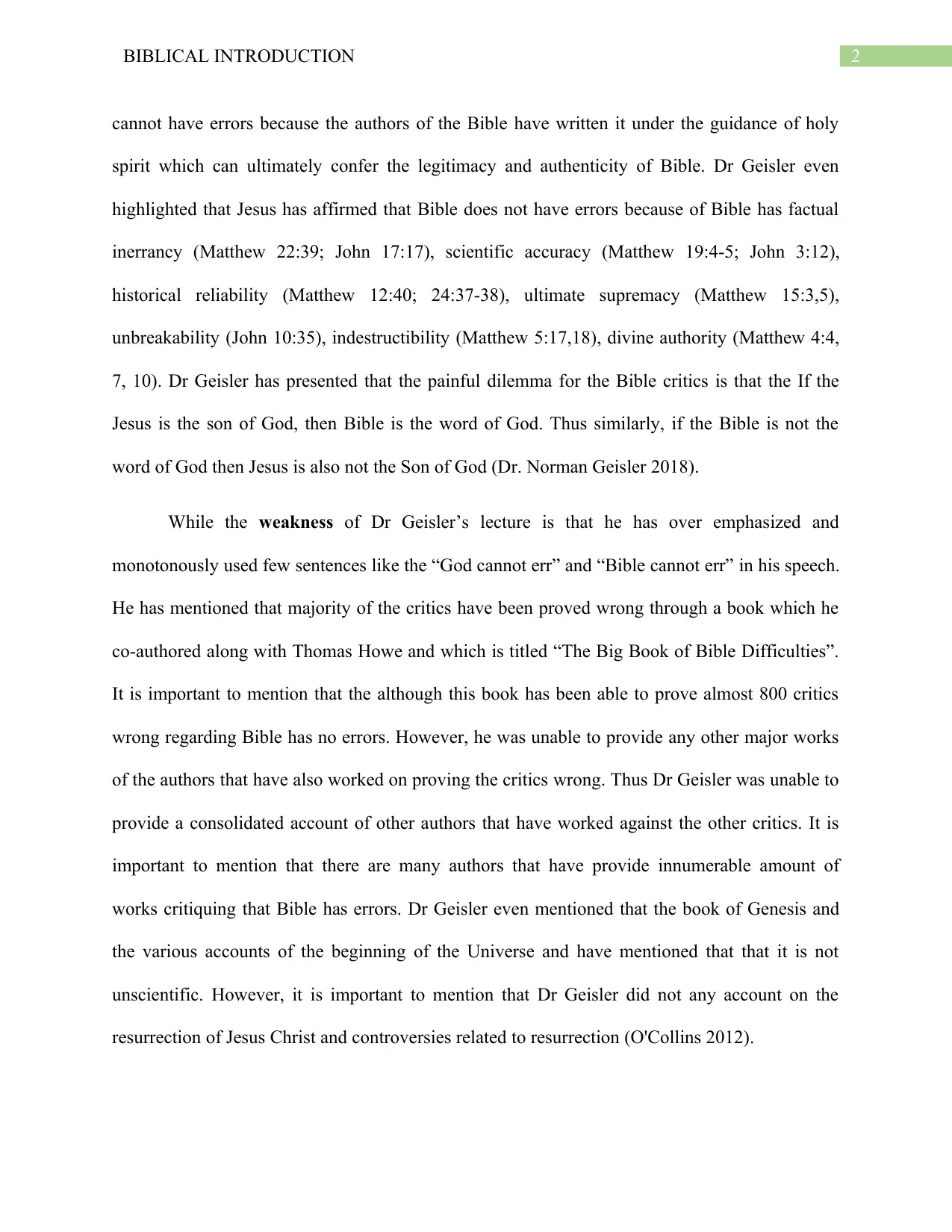
2BIBLICAL INTRODUCTION
cannot have errors because the authors of the Bible have written it under the guidance of holy
spirit which can ultimately confer the legitimacy and authenticity of Bible. Dr Geisler even
highlighted that Jesus has affirmed that Bible does not have errors because of Bible has factual
inerrancy (Matthew 22:39; John 17:17), scientific accuracy (Matthew 19:4-5; John 3:12),
historical reliability (Matthew 12:40; 24:37-38), ultimate supremacy (Matthew 15:3,5),
unbreakability (John 10:35), indestructibility (Matthew 5:17,18), divine authority (Matthew 4:4,
7, 10). Dr Geisler has presented that the painful dilemma for the Bible critics is that the If the
Jesus is the son of God, then Bible is the word of God. Thus similarly, if the Bible is not the
word of God then Jesus is also not the Son of God (Dr. Norman Geisler 2018).
While the weakness of Dr Geisler’s lecture is that he has over emphasized and
monotonously used few sentences like the “God cannot err” and “Bible cannot err” in his speech.
He has mentioned that majority of the critics have been proved wrong through a book which he
co-authored along with Thomas Howe and which is titled “The Big Book of Bible Difficulties”.
It is important to mention that the although this book has been able to prove almost 800 critics
wrong regarding Bible has no errors. However, he was unable to provide any other major works
of the authors that have also worked on proving the critics wrong. Thus Dr Geisler was unable to
provide a consolidated account of other authors that have worked against the other critics. It is
important to mention that there are many authors that have provide innumerable amount of
works critiquing that Bible has errors. Dr Geisler even mentioned that the book of Genesis and
the various accounts of the beginning of the Universe and have mentioned that that it is not
unscientific. However, it is important to mention that Dr Geisler did not any account on the
resurrection of Jesus Christ and controversies related to resurrection (O'Collins 2012).
cannot have errors because the authors of the Bible have written it under the guidance of holy
spirit which can ultimately confer the legitimacy and authenticity of Bible. Dr Geisler even
highlighted that Jesus has affirmed that Bible does not have errors because of Bible has factual
inerrancy (Matthew 22:39; John 17:17), scientific accuracy (Matthew 19:4-5; John 3:12),
historical reliability (Matthew 12:40; 24:37-38), ultimate supremacy (Matthew 15:3,5),
unbreakability (John 10:35), indestructibility (Matthew 5:17,18), divine authority (Matthew 4:4,
7, 10). Dr Geisler has presented that the painful dilemma for the Bible critics is that the If the
Jesus is the son of God, then Bible is the word of God. Thus similarly, if the Bible is not the
word of God then Jesus is also not the Son of God (Dr. Norman Geisler 2018).
While the weakness of Dr Geisler’s lecture is that he has over emphasized and
monotonously used few sentences like the “God cannot err” and “Bible cannot err” in his speech.
He has mentioned that majority of the critics have been proved wrong through a book which he
co-authored along with Thomas Howe and which is titled “The Big Book of Bible Difficulties”.
It is important to mention that the although this book has been able to prove almost 800 critics
wrong regarding Bible has no errors. However, he was unable to provide any other major works
of the authors that have also worked on proving the critics wrong. Thus Dr Geisler was unable to
provide a consolidated account of other authors that have worked against the other critics. It is
important to mention that there are many authors that have provide innumerable amount of
works critiquing that Bible has errors. Dr Geisler even mentioned that the book of Genesis and
the various accounts of the beginning of the Universe and have mentioned that that it is not
unscientific. However, it is important to mention that Dr Geisler did not any account on the
resurrection of Jesus Christ and controversies related to resurrection (O'Collins 2012).
⊘ This is a preview!⊘
Do you want full access?
Subscribe today to unlock all pages.

Trusted by 1+ million students worldwide
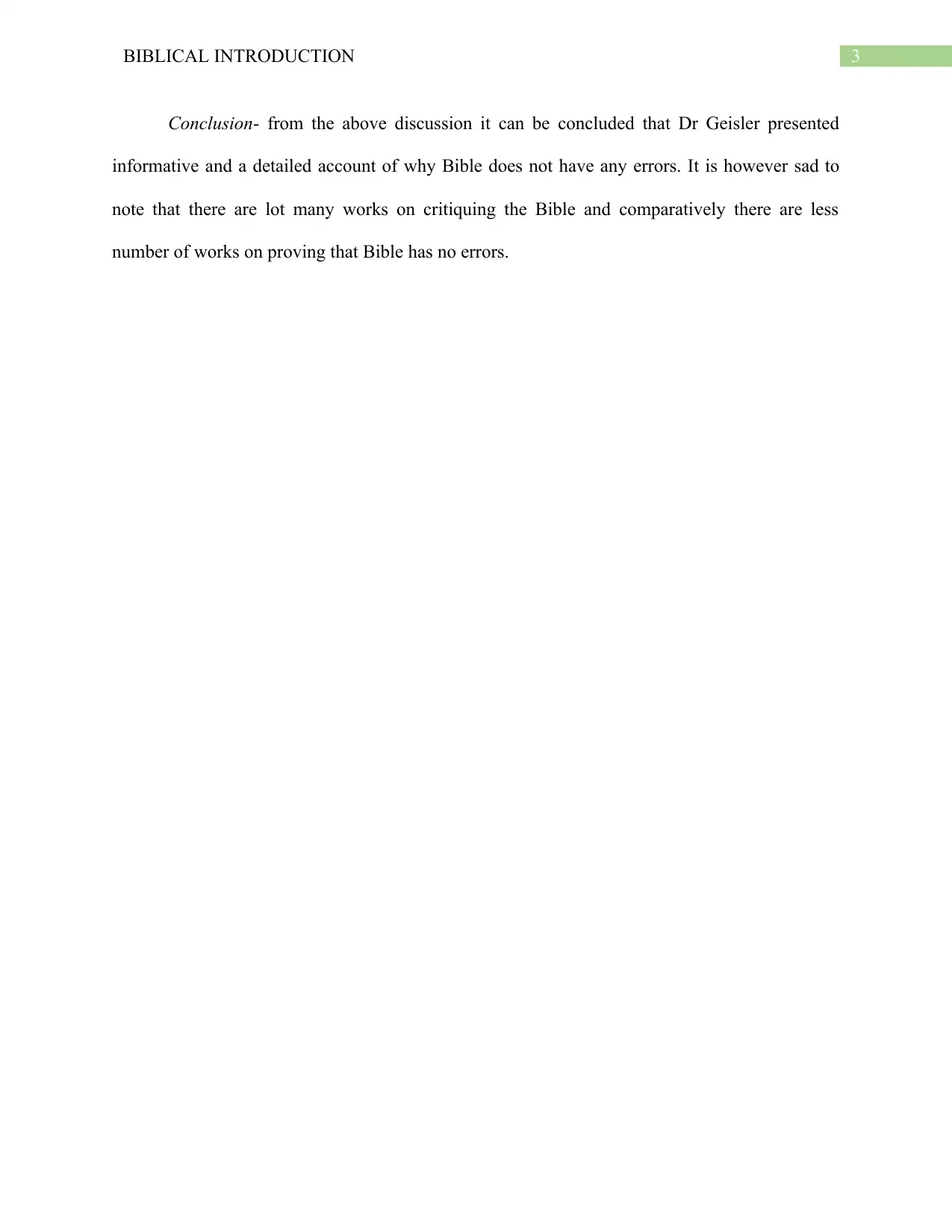
3BIBLICAL INTRODUCTION
Conclusion- from the above discussion it can be concluded that Dr Geisler presented
informative and a detailed account of why Bible does not have any errors. It is however sad to
note that there are lot many works on critiquing the Bible and comparatively there are less
number of works on proving that Bible has no errors.
Conclusion- from the above discussion it can be concluded that Dr Geisler presented
informative and a detailed account of why Bible does not have any errors. It is however sad to
note that there are lot many works on critiquing the Bible and comparatively there are less
number of works on proving that Bible has no errors.
Paraphrase This Document
Need a fresh take? Get an instant paraphrase of this document with our AI Paraphraser
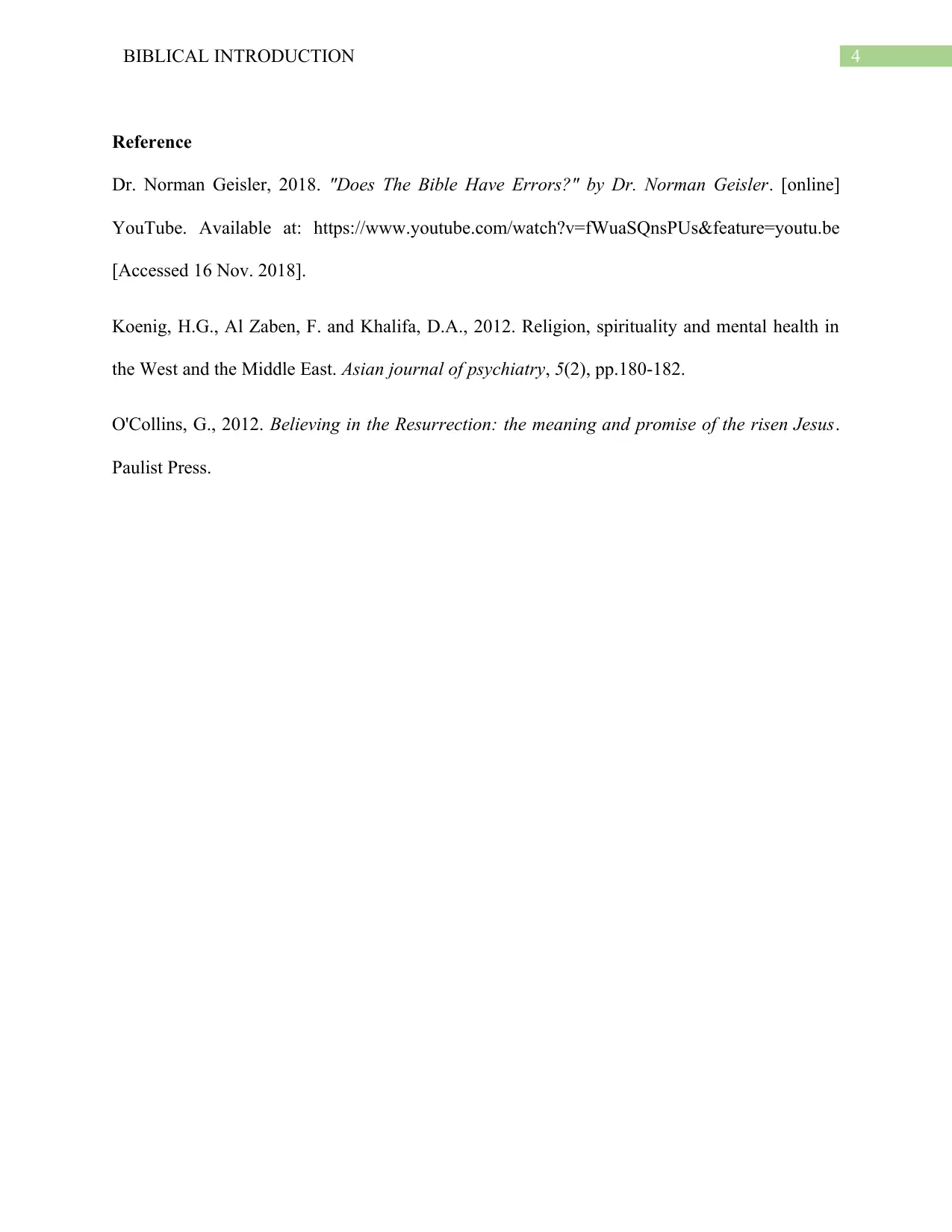
4BIBLICAL INTRODUCTION
Reference
Dr. Norman Geisler, 2018. "Does The Bible Have Errors?" by Dr. Norman Geisler. [online]
YouTube. Available at: https://www.youtube.com/watch?v=fWuaSQnsPUs&feature=youtu.be
[Accessed 16 Nov. 2018].
Koenig, H.G., Al Zaben, F. and Khalifa, D.A., 2012. Religion, spirituality and mental health in
the West and the Middle East. Asian journal of psychiatry, 5(2), pp.180-182.
O'Collins, G., 2012. Believing in the Resurrection: the meaning and promise of the risen Jesus.
Paulist Press.
Reference
Dr. Norman Geisler, 2018. "Does The Bible Have Errors?" by Dr. Norman Geisler. [online]
YouTube. Available at: https://www.youtube.com/watch?v=fWuaSQnsPUs&feature=youtu.be
[Accessed 16 Nov. 2018].
Koenig, H.G., Al Zaben, F. and Khalifa, D.A., 2012. Religion, spirituality and mental health in
the West and the Middle East. Asian journal of psychiatry, 5(2), pp.180-182.
O'Collins, G., 2012. Believing in the Resurrection: the meaning and promise of the risen Jesus.
Paulist Press.
1 out of 5
Related Documents
Your All-in-One AI-Powered Toolkit for Academic Success.
+13062052269
info@desklib.com
Available 24*7 on WhatsApp / Email
![[object Object]](/_next/static/media/star-bottom.7253800d.svg)
Unlock your academic potential
Copyright © 2020–2026 A2Z Services. All Rights Reserved. Developed and managed by ZUCOL.




